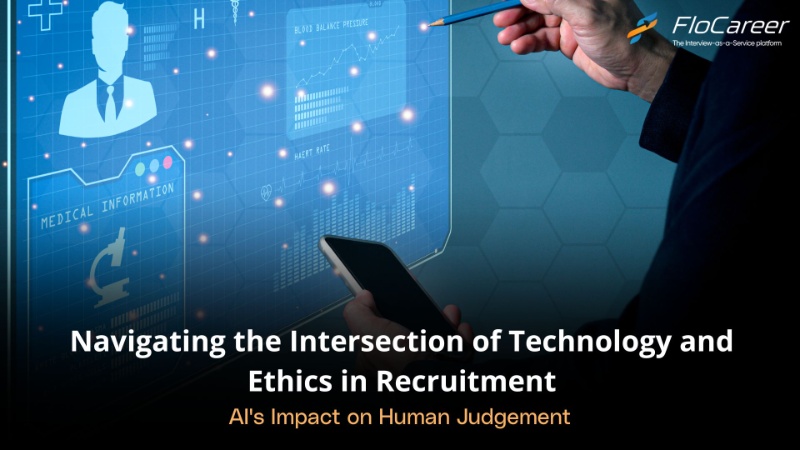Navigating the Intersection of Technology and Ethics in Recruitment: AI's Impact on Human Judgment
AI has become an integral part of the ongoing digital revolution, permeating various platforms and offering assistance across diverse sectors. The Human Resources industry has witnessed a notable transformation through the integration of AI, particularly in the recruitment process. Despite its proven advantages, especially in reducing time-to-hire and enhancing the quality of hiring, the ethical dimension of AI in recruitment remains a topic of consideration and debate.

Exploring the Rapid Integration of AI in HR Processes
The contemporary digital landscape has witnessed a swift shift toward AI, with the human resources sector at the forefront of embracing change. The integration of AI tools, such as Flocareer's interview intelligence platform, has shown promising results, streamlining the recruitment process and enhancing the overall candidate experience. However, ethical concerns surrounding the use of AI in recruitment persist.
Unveiling the Positive Transformations Brought by AI in Recruitment
Before delving into the ethical intricacies associated with AI in recruitment, it's essential to acknowledge the positive transformations it has brought to the human resources industry. These changes include:
Efficiency in Application Processing:
Managing a multitude of resumes during hiring processes can be overwhelming. AI, integrated into the Application Tracking System, expedites candidate shortlisting, saving valuable time for recruiters and allowing them to focus on critical tasks.
Structured Interviews for Improved Candidate Experience:
Traditional interviews often rely on recruiters' instincts, leading to variations in the quality of hiring and candidate experience. Structured interviews, facilitated by AI tools, ensure a more organized and thoughtful approach, enhancing the overall candidate experience.
Candidate Performance Analysis Through AI Algorithms:
Platforms like Flocareer leverage advanced AI algorithms to not only assist in interviews but also generate a unique candidate assessment score. This score, based on various parameters and interviewer feedback, aids hiring managers in finalizing hiring decisions.
Interviewer Training with AI Assistance:
AI, as demonstrated by Flocareer's video interview platform, can analyze both candidate and interviewer performance. This data-driven approach assists in providing valuable feedback to interviewers, contributing to their skill development and reducing biases in the interview process.
Addressing Ethical Challenges in AI-Driven Recruitment
While AI brings significant benefits to recruitment, ethical challenges must be carefully considered and addressed:
Potential Biases Within AI Algorithms:
The use of predefined algorithms in AI assessments raises concerns about potential biases. Organizations must ensure continuous improvement of algorithms, transparency in decision-making processes, and the absence of inherent biases.
Biases and Fairness in AI Training Data:
The data used to train AI models may unintentionally introduce biases. Vigilance is required to identify and address biases related to protected classes, ensuring fair assessments during recruitment processes.
Human-Centric Approach to Decision-Making:
The judgment and intuition of humans remain unparalleled, highlighting the importance of using AI as a complementary tool rather than a replacement. Decision-making authority should always reside with humans to maintain a human-centric approach.
Ethical Evolution and Framework Development:
Continuous ethical evaluation and framework development are imperative to mitigate ethical concerns associated with AI in recruitment. Collaboration with experts from various fields can contribute to the establishment of robust ethical guidelines.
Monitoring and Ethical Leadership:
Leadership plays a pivotal role in defining and upholding ethical standards. Regular monitoring of AI systems for biases and ethical issues, coupled with timely improvements, ensures responsible AI usage in recruitment.
Striking a Balance for Ethical AI in Recruitment
While ethical considerations in AI-driven recruitment are paramount, the benefits of tools like Flocareer's interview intelligence platform cannot be overlooked. Organizations must navigate this intersection of technology and ethics with a commitment to transparency, fairness, and continuous improvement. As AI continues to shape the future of recruitment, ethical boundaries and responsible usage will be instrumental in fostering trust and reliability in the hiring process. Consider adopting Flocareer for interview outsourcing to ensure an unbiased and ethical approach to candidate assessments.
Check out our latest blog on AI Driven Interview Notes


